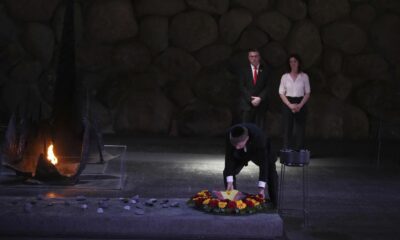A military court in Myanmar has handed down a life prison sentence to a local journalist and sentenced one of his colleagues to 20 years after convicting them under a counterterrorism law, their editor confirmed on Wednesday (August 28, 2024).
The journalists, Myo Myint Oo and Aung San Oo from the independent online news service Dawei Watch, received some of the harshest sentences dealt to journalists since the military took over from the elected government of Aung San Suu Kyi in February 2021, sparking armed resistance and an ongoing civil war.
Myanmar is known for being one of the world’s biggest jailers of journalists, ranking only behind China. Reporters Without Borders, a press freedom group based in Paris, places Myanmar near the bottom of its Press Freedom Index at 171st out of 180 countries.
Recently, two freelance journalists in Myanmar were killed, with one reportedly captured by security forces during a raid on their home in the state of Mon. Several local resistance fighters also lost their lives in the operation.
The two journalists from Dawei Watch, Myo Myint Oo, 41, and Aung San Oo, 49, were arrested separately in December at their homes in Myeik, a coastal town about 560 kilometers south of Yangon, just three days after emerging from hiding.
The military government has not provided any official comments on their cases.
Kyaw San Min, the chief editor of Dawei Watch media, revealed to The Associated Press that Aung San Oo was initially sentenced to 20 years in prison by a military court in Myeik prison in February, while Myo Myint Oo received a life sentence from the same court in May. However, further details were not disclosed.
Both journalists were convicted under Myanmar’s Counterterrorism Law, although the specifics of their alleged offenses were not made clear. The law targets acts of violence and incitement to participate in terrorist activities.
Kyaw San Min shared that the information about the sentences had been received earlier but was only disclosed now that the safety of the journalists’ family members had been ensured. He did not provide additional details.
“The severity of the sentences imposed on the two journalists is highly unjust. Such harsh penalties for journalists are unwarranted,” the editor remarked.
According to Kyaw San Min, a total of five reporters and a columnist from Dawei Watch have been arrested since the military crackdown on independent media began following the coup. Three of the journalists have since been released.
Currently, most media outlets, including Dawei Watch, operate semi-clandestinely, publishing online while staff members strive to avoid arrest. Some media organizations operate from exile.
In a statement posted on its Facebook page, Dawei Watch strongly condemned the military government for the illegal detention and interrogation of journalists without affording them the right to a fair defense under the law.
“We call for their immediate release,” the statement emphasized.
The security forces reportedly informed Myo Myint Oo and Aung San Oo that they were detained due to their reporting activities, with their laptops and phones confiscated.
During four days in a detention center, the two journalists were subjected to physical abuse before being transferred to prison, as outlined in the statement. It has been reported by various sources, including the AP, that detainees in Myanmar frequently face torture following their arrests.
“These extreme court rulings are intended to instill fear among all journalists and will undoubtedly have a chilling effect across independent media in Myanmar,” Shawn Crispin, the Southeast Asia representative for the Committee to Protect Journalists based in New York, stated in an email.
Since the military takeover, at least seven media workers in Myanmar have been killed, with others reportedly tortured while in detention. Media workers in Myanmar who monitor the situation indicate that at least 15 media outlets have had their licenses revoked and approximately 172 journalists have been arrested, with around 40 to 50 still in detention, half of whom have been convicted and sentenced.
Most of the detained journalists have been charged with incitement, spreading false news, or agitating against government employees, in addition to violations of the Counterterrorism Law.








































